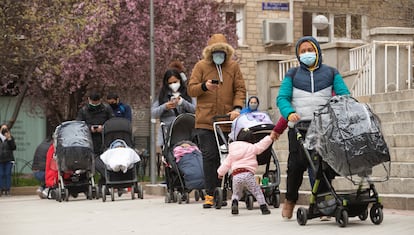Coronavirus crisis in Spain: ‘I never imagined myself asking for help’
As a result of the pandemic, half a million people have sought support for the first time or after a long interlude from the Catholic charity Caritas

The coronavirus pandemic has triggered an “unprecedented” crisis that has done much to exacerbate the already significant social inequalities in Spain. That’s according to Caritas Spain, the Catholic Church’s official charity organization in the country, which presented a report on March 9 on its activities in the last 12 months.
The report, released by the charity’s Social Observatory, states that 500,000 people have come to the organization for help for the first time, or have done so again after an extended interlude. In fact, one in three people helped by Caritas falls into these two categories. As a result, requests for assistance have shot up by 57%, and numbers have even tripled in certain areas and at specific times.
Around 700,000 people helped by Caritas are unable to meet their basic utility costs
Andrés Mendoza and his family are a case in point. In recent months, their lives have been turned upside down by the coronavirus crisis. Prior to the pandemic, Mendoza, 49, worked as a security guard and his partner was a transport monitor for people with disabilities in Madrid. They were not living in the lap of luxury, but they were getting by. Then in March last year, Mendoza’s partner was put on the government’s ERTE furlough scheme – financial support she has yet to receive – and the family lost a significant slice of its income. Mendoza himself earns just €500 a month from his part-time job, which, as he points out, “is impossible” to live on, particularly when there are four children to support. The situation has been such that Mendoza went to Caritas for the first time in June and now receives a daily meal for each member of the family. “I never imagined myself asking for help. It has been quite hard,” he says.
The organization’s 70 branches across the country provide assistance in meeting basic needs, such as food, shelter and legal advice. Caritas does not yet have a figure on the total number of people it has helped since the beginning of the pandemic, but believes it is more than the 2.4 million recorded in 2019. What the organization is clear on is the severe drain on income caused by the pandemic. According to its report, 258,000 people who have been helped by Caritas live in households with no income, 75,000 more than prior to the pandemic.
Raúl Flores, the coordinator of the Caritas research team, pointed out during the presentation of the report that more than half of job seekers are unable to find work. “In a social system where integration is predominantly based on a good job, these people are being deprived of a basic right,” said Flores.
Poverty and social exclusion are going to increase. It is going to depend on how many family-protection mechanisms are put in placeRaúl Flores, coordinator of the Caritas research team
The difficulties involved in finding work mean that more than 825,000 people helped by Caritas are living in severe poverty – an income of less than €370 per month for a single-person household or less than €776 for families consisting of two adults and two children. Moreover, around 700,000 people are unable to meet their basic utility costs – they cannot heat their homes adequately or turn on the lights when they need to. Mendoza’s home has no heating, but Mendoza makes it a priority to pay the electricity and gas bills. However, covering all the family’s expenses has turned into an impossible task. The family cannot afford to pay their rent, which is €550 a month. “Two months ago, we received an eviction order,” he says.
According to Flores, “poverty and social exclusion are going to increase. It is going to depend on how many family protection mechanisms are put in place.”
Natalia Peiro, secretary general of Caritas, points out that the economic blow of the pandemic struck before many were able to put the 2008 financial crisis behind them. “We had a fragile and precarious labor market [before 2020], with complicated access to housing for people on low incomes and with a social model in which vulnerability was the reality for a large percentage of citizens,” she says. Before the pandemic, 18.4% of Spain’s population – 8.5 million people – were living in socially excluded circumstances, according to data from Caritas’ 2019 VIII Foessa Report, a study that takes into account 35 variables including income, health, education and access to housing. Of these 8.5 million, more than four million were suffering severe social exclusion. “The pandemic hit within this context and its consequences have been especially serious for those who were already in a vulnerable situation, resulting in an increase in the social divide,” Flores pointed out.
The problem is that financial support is not reaching people. Mendoza applied for the guaranteed minimum income in August last year to try to make ends meet. “I still haven’t heard back,” he says. A total of 96.4% of the families helped by Caritas have not received the guaranteed minimum income after applying for it, while 12.8% have been denied it. But there has also been a sizeable contingent who never applied due to lack of information. According to the report, 67% said they did not have enough information to request the financial aid.
Making matters worse, four out of every 10 families no longer receive support from regional authorities. As Flores pointed out, the data reflects a situation “pretty far from an acceptable reality.” He added: “For the already-battered economies of families, the tsunami that has paralyzed the economy and the effects of its sustained wave are lasting too long. Any recovery in employment has been nothing more than a mirage.”
Homelessness, loneliness and the digital divide
Caritas has also highlighted the reality of homeless people, who had nowhere to stay during the coronavirus lockdown and no opportunity to maintain a modicum of hygiene. “Sleeping on the street or staying in temporary or emergency shelters have exposed homeless people – a population already at high medical risk – to high potential levels of viral transmission,” Peiro pointed out. In 2019, Caritas managed to provide shelter to 5,000 homeless people and helped more than 35,000 rough sleepers. In recent months the organization has set up 13 new centers and more than 1,400 new complementary places.
Peiro also flagged up the loneliness that the elderly have experienced on account of the pandemic. The organization has helped 11,000 elderly people since March of last year, compared to the 7,000 it helped in 2019. “The level of social vulnerability that has become evident during this crisis also highlights the scarce resources that exist to promote home care,” said Peiro.
Meanwhile, equal job and education opportunities have been undermined for those who don’t belong to the virtual community given the rise of teleworking and online learning. More than half (52%) of the families helped by Caritas are technologically marginalized as they either lack an unlimited internet connection, devices or sufficient online skills. As a result, more than 60% of households with at least one minor had difficulties in completing the school year last summer.
The Caritas report also touched on the use of the €65 million provided by the 70,666 people who donated to the “Caritas in the face of the coronavirus” campaign. So far, the organization has allocated €41 million to emergency aid, €3.3 million to vulnerable children and nearly €1 million to health supplies and protective equipment. Caritas has also used €2.5 million to support a total of 65 projects responding to the effects of the pandemic in poor countries.
English version by Heather Galloway.
Tu suscripción se está usando en otro dispositivo
¿Quieres añadir otro usuario a tu suscripción?
Si continúas leyendo en este dispositivo, no se podrá leer en el otro.
FlechaTu suscripción se está usando en otro dispositivo y solo puedes acceder a EL PAÍS desde un dispositivo a la vez.
Si quieres compartir tu cuenta, cambia tu suscripción a la modalidad Premium, así podrás añadir otro usuario. Cada uno accederá con su propia cuenta de email, lo que os permitirá personalizar vuestra experiencia en EL PAÍS.
¿Tienes una suscripción de empresa? Accede aquí para contratar más cuentas.
En el caso de no saber quién está usando tu cuenta, te recomendamos cambiar tu contraseña aquí.
Si decides continuar compartiendo tu cuenta, este mensaje se mostrará en tu dispositivo y en el de la otra persona que está usando tu cuenta de forma indefinida, afectando a tu experiencia de lectura. Puedes consultar aquí los términos y condiciones de la suscripción digital.









































